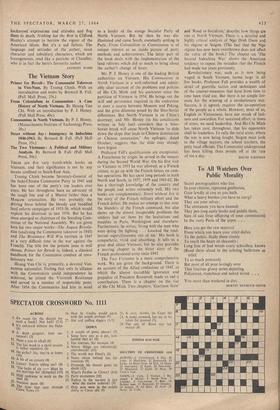The Vietnam Story
Primer for Revolt : The Communist Takeover in Viet-Nam. By Truong Chinh. With an introduction and notes by Bernard B. Fall. (Pall Mall Press, 35s.) From Colonialism to Communism : A Case History of North Vietnam. By Hoang Van Chi. With an introduction by P. J. Honey. (Pall Mall Press, 40s.) Communism in North Vietnam. By P. J. Honey. (Massachusetts Institute of Technology Press, 38s.) THESE are five very worth-while books on Vietnam, and their significance is not by any means confined to South-East Asia.
Truong Chinh became Secretary-General of the Indo-Chinese Communist Party in 1941 and has been one of the party's top leaders ever since. He has throughout been an advocate of the tough line and of a Maoist rather than a Moscow orientation. He was probably the driving force behind the bloody and muddled land reform campaigns of 1953-56, which would explain his dismissal in late 1956. But he has since emerged as chairman of the Standing Com- mittee of the National Assembly. We are given here his two major works-The August Revolu- tion (analysing the Communist takeover in 1945) and The Resistance Will Win (written in 1947 at a very difficult time in the war against the French). The title for the present issue is well chosen. Primer for Revolt is, indeed, a classical handbook for the Communist conduct of revo- lutionary war.
Hoang Van Chi is, primarily, a devoted Viet- namese nationalist. Feeling that only in alliance with the Communists could independence be achieved, he joined the Vietminh Resistance and served in a number of responsible posts. After 1954 the Communists had him in mind
as a leader of the stooge Socialist Party of North Vietnam. But, by then he was dis- illusioned and came South, eventually settling in Paris. From Colonialism to Communism is of unique interest as an inside picture of party methods and achievements. The latter part of the book deals with the implementation of the land reforms which did so much to bring about the author's change of heart.
Mr. P. J. Honey is one of the leading British authorities on Vietnam. His Communism in North Vietnam is a well-informed and admir- ably clear account of the problems and policies of Ho Chi Minh and his associates since the partition of Vietnam in 1954. He brings out the skill and persistence required in the endeavour to steer a course between Moscow and Peking, and the grim dilemma posed by the Sino-Soviet differences. But North Vietnam is on China's doorstep; and Mr. Honey (in his conclusions written in July last) considers that a Sino- Soviet break will cause North Vietnam 'to slide down the slope that leads to Chinese domination or Chinese annexation.' An epilogue, dated October, suggests that the slide may already have begun.
Professor Fall's qualifications are exceptional. A Frenchman by origin, he served in the moguls during the Second World War. On his first visit to Vietnam in 1953 he was allowed, as a French citizen, to go up with the French forces on com- bat operations. He has spent long periods in both North and South, in 1957, 1959 and 1961-62. He has a thorough knowledge of the country and the people and writes extremely well. His two books are complementary. Street without Joy is the story of the French military effort and the French defeat. He makes no attempt to slur over the blunders of the French command, but also shows up the almost insuperable problems the soldiers had set them by the hesitations and muddles in Paris, Washington and elsewhere. Furthermore, he writes, 'living with the men who were doing the fighting . . . knocked the intel- lectual superciliousness out of me.' His book is sympathetic, vivid and absorbing. It tells us a great deal about Vietnam; but he also provides a moving chapter in the bitter story of the French professional army since 1945. The Two Vietnams is a more comprehensive work. We are given the background. There is an account of the Allied confusions of 1945, to which the almost incredible ignorance and prejudice of President Roosevelt made so sad a contribution. There is a chapter on the rise of Ho Chi Minh. Two chapters, 'Garrison State'
and 'Road to Socialism,' describe how things are run in North Vietnam. There is a detailed and highly critical analysis of Ngo Dinh Diem and his regime at Saigon. (The fact that the Ngo regime has now been overthrown does not affect the value of the book.) The chapter on 'The Second Indochina War' shows the American tendency to repeat the mistakes that the French had made ten years previously.
Revolutionary war, such as is now being waged in South Vietnam, looms large in all five books. Professor Fall provides a wealth of detail of guerrilla tactics and techniques and of the counter-measures that have from time to time been tried out. But there is no simple for- mula for the winning of a revolutionary war. Success, it is agreed, requires the co-operation of the people as a whole. However, most of us, English or Vjetnamese, have our streak of lazi- ness and cowardice. For sustained effort, in times of stress, we need leadership. And Ho Chi Minh has taken care, throughout, that his opponents shall be leaderless. To rally the rural areas, where the war is now being fought, Saigon must look to the village mayors, the school teachers, the petty local officials. The Communist underground has been killing these people off at the rate


































 Previous page
Previous page